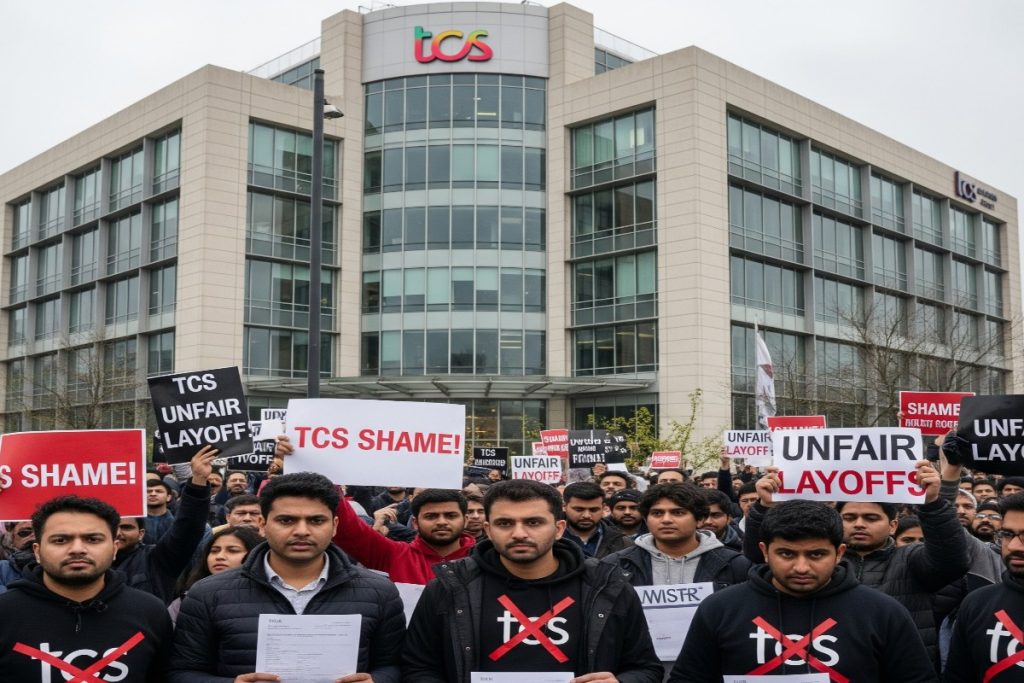Introduction
The computer behemoth Tata Consultancy Services (TCS) of India has grabbed headlines once more, but this time for a cause that is upending the foundation of the IT sector. Employee worries have been raised by reports that TCS plans to eliminate up to 12,000 positions. Are these only business choices? Or indications of a more significant change taking place in the global IT scene? Let’s examine the facts of the TCS layoffs and their implications for both present and aspiring IT workers.
What’s Driving TCS to Cut 12,000 Jobs?
Several industry insiders indicate that a significant reorganization exercise is in progress, even though TCS has not disclosed an official figure. However, why now?
- cost increases in the face of global inflation.
- change in customer spending, particularly in Europe and the United States.
- In order to achieve digital transformation, fewer but more specialized jobs are needed.
It’s interesting to note that TCS has traditionally been cautious when it comes to mass layoffs. Instead of a brief setback, the scale this time points to a more significant strategy shift.
It’s possible that the TCS layoffs are a sign of a larger industry correction rather than a singular incident.
AI or Slow Growth: Who’s to Blame?
Two main factors are currently under discussion: automation and the slowdown of the global market.
- AI and automation technologies are progressively becoming adept at managing entry-level and repetitive IT tasks, ranging from testing to fundamental coding.
- Conversely, economic uncertainties have compelled clients to reduce their IT budgets, particularly concerning large-scale legacy projects.
- What we are witnessing is a perfect storm: technological advancements diminishing the demand for specific roles, coupled with decreased client demand that is prompting companies to operate with fewer resources.
- Thus, while sluggish growth contributes to the situation, AI is undoubtedly hastening the need for companies to reevaluate their workforce.
- The layoffs at TCS illustrate that digital transformation is more than just a buzzword it is rapidly displacing traditional roles at an unexpected pace.

End of the “Safe IT Job” Era?
For many years, employment at a company such as TCS was regarded as a secure and stable career option. However, that perception is currently being challenged.
- Job security within the IT sector is no longer assured even among the leading firms.
- Younger professionals are beginning to question the merit of dedicating years to service-oriented positions.
- The emergence of gig work, startups, and remote-first organizations presents new (albeit riskier) opportunities.
In actuality, the idea of a “forever job” is rapidly eroding. The recent layoffs at TCS serve as yet another indication that careers in IT should be founded on adaptability rather than mere loyalty.
Mid- & Senior-Mgmt Roles on Shaky Ground
While entry-level and junior positions are at risk of automation, mid-level and senior management are also experiencing significant pressure. Here are the reasons:
Overly complex structures: Organizations are reducing the number of management layers to maintain agility.
Insufficient technical advancement: Numerous senior positions have not kept pace with developments in AI, cloud computing, or data transformation skills.
Decision-making delays: Agile frameworks prefer smaller, cross-functional teams instead of traditional hierarchical command structures.
For those in leadership positions within IT, the message is unequivocal: adapt or face obsolescence. Even years of experience may not safeguard you if you fail to align with emerging technological priorities.
The recent layoffs at TCS highlight a stark reality seniority no longer guarantees job security.
Skill Mismatch or Strategic Shift to Automation?
One of the most discussed aspects of this layoff wave is the growing skill mismatch in the IT industry.
- Companies need talent in AI, cybersecurity, cloud computing, and data science.
- But thousands of employees are still working on outdated tech stacks or traditional project management.
- Upskilling efforts exist but they’re often too slow, or not aligned with market demands.
Rather than wait, TCS and others are choosing to reshape their workforce through layoffs and fresh hiring faster and cheaper than reskilling at scale.
This points to a strategic shift, not a short-term cost cut. If you’re still relying on 5-year-old tech knowledge, you’re already behind.
The TCS layoffs are a wake-up call: skills are the new job security.
What Should IT Pros Learn from This?
Here’s what every IT professional should take away from this moment:
- Upskill continuously: Whether it’s GenAI, cloud certifications, or product thinking—stay updated.
- Diversify your experience: Work across domains, not just technologies.
- Build a personal brand: In a gig economy, your visibility is as important as your résumé.
- Be open to remote and global roles: Work is increasingly borderless. Your next opportunity may not be in your city—or even your country.
The workplace is changing quickly, and people who adapt well will prosper. Those who wait for old jobs to return… may be left behind.
Conclusion
Do IT Professionals Need to Take Note of TCS Layoffs? Yes loud and clear. The current TCS layoffs represent more than mere figures on a spreadsheet they are indicators. Indicators that the IT sector is evolving from a focus on volume to one on value, from standard practices to innovation, and from permanent employment to continuous learning.
However, with disruption comes opportunity.If you are a professional reconsidering your next steps, think about engaging with the remote work economy. Platforms such as Wiraa facilitate the process of finding remote positions that align with your skills, no matter your location in the world. Whether you are moving away from a traditional role or aiming to secure your career for the future, Wiraa can link you with progressive employers eager to hire on a global scale.
Because by 2025, the emphasis will not be on your workplace it will be on your work methodology. And Wiraa is the starting point for that journey.



